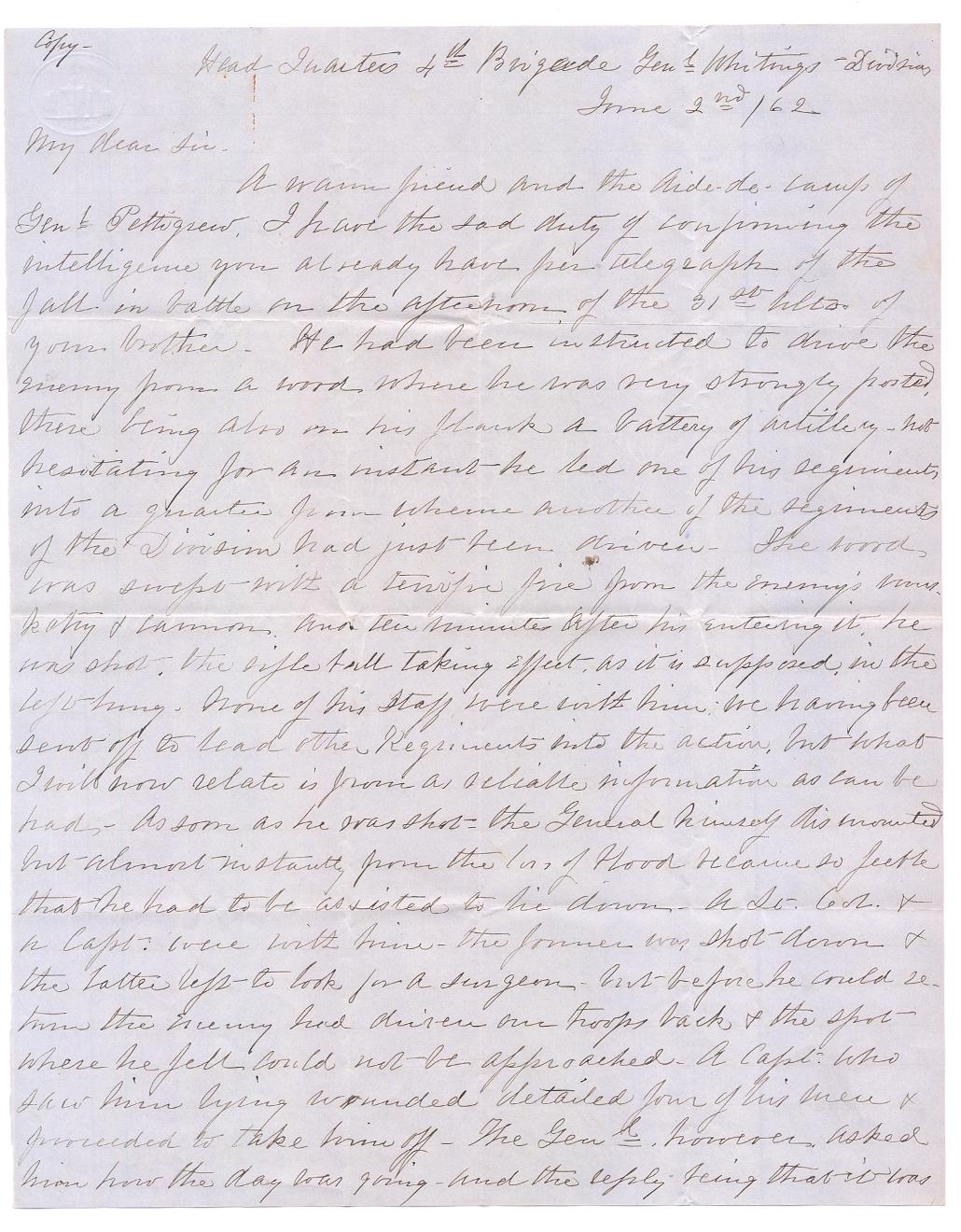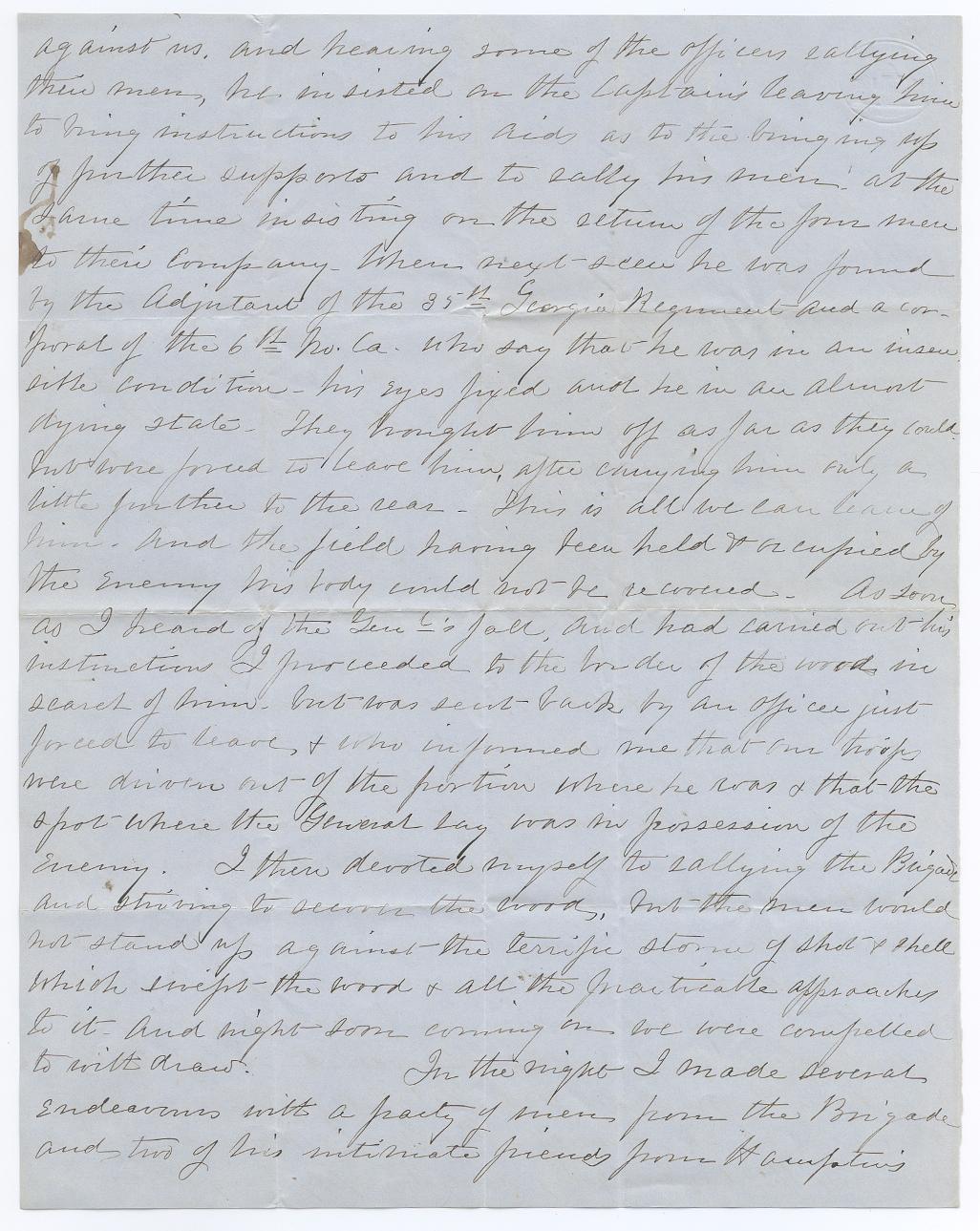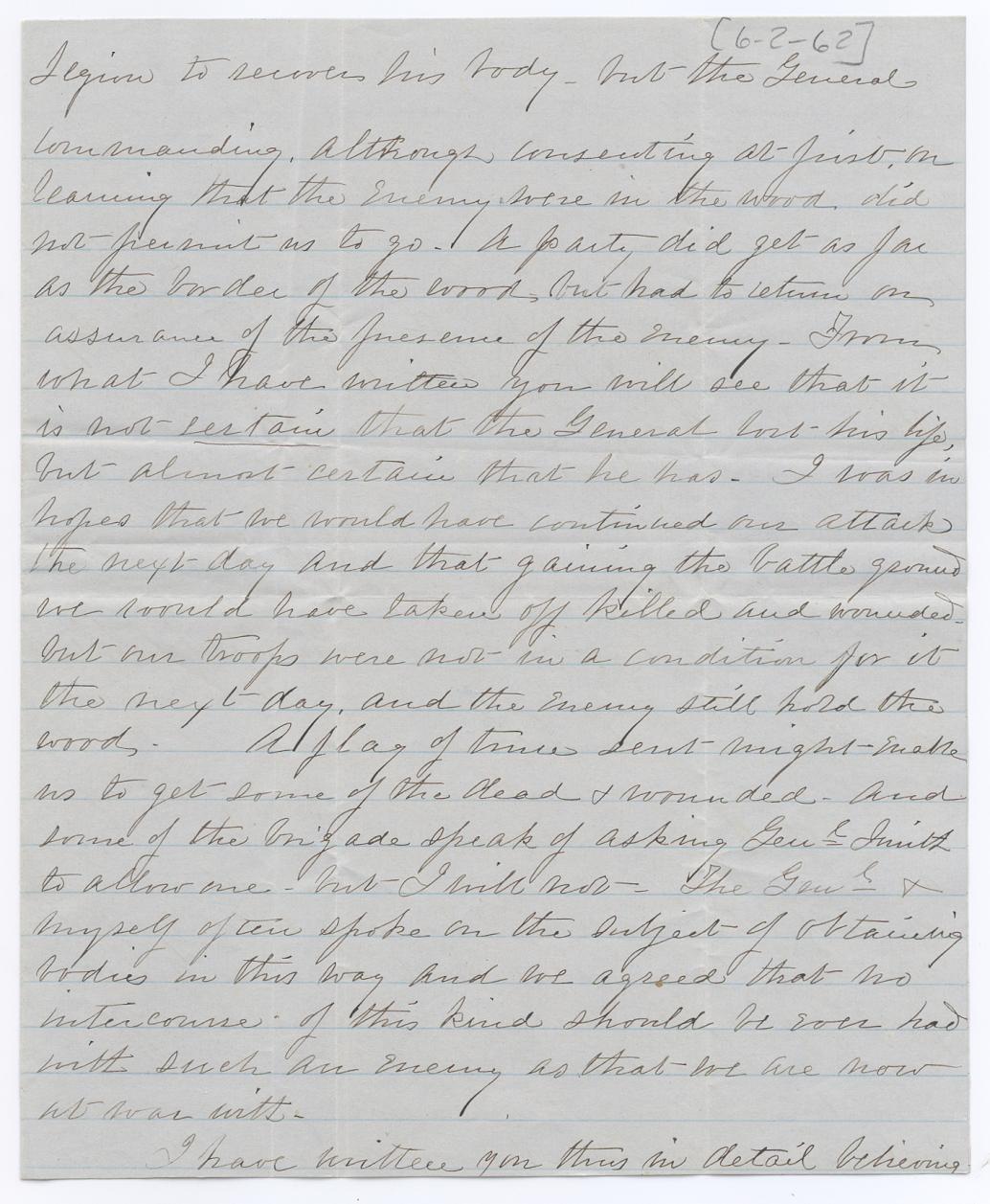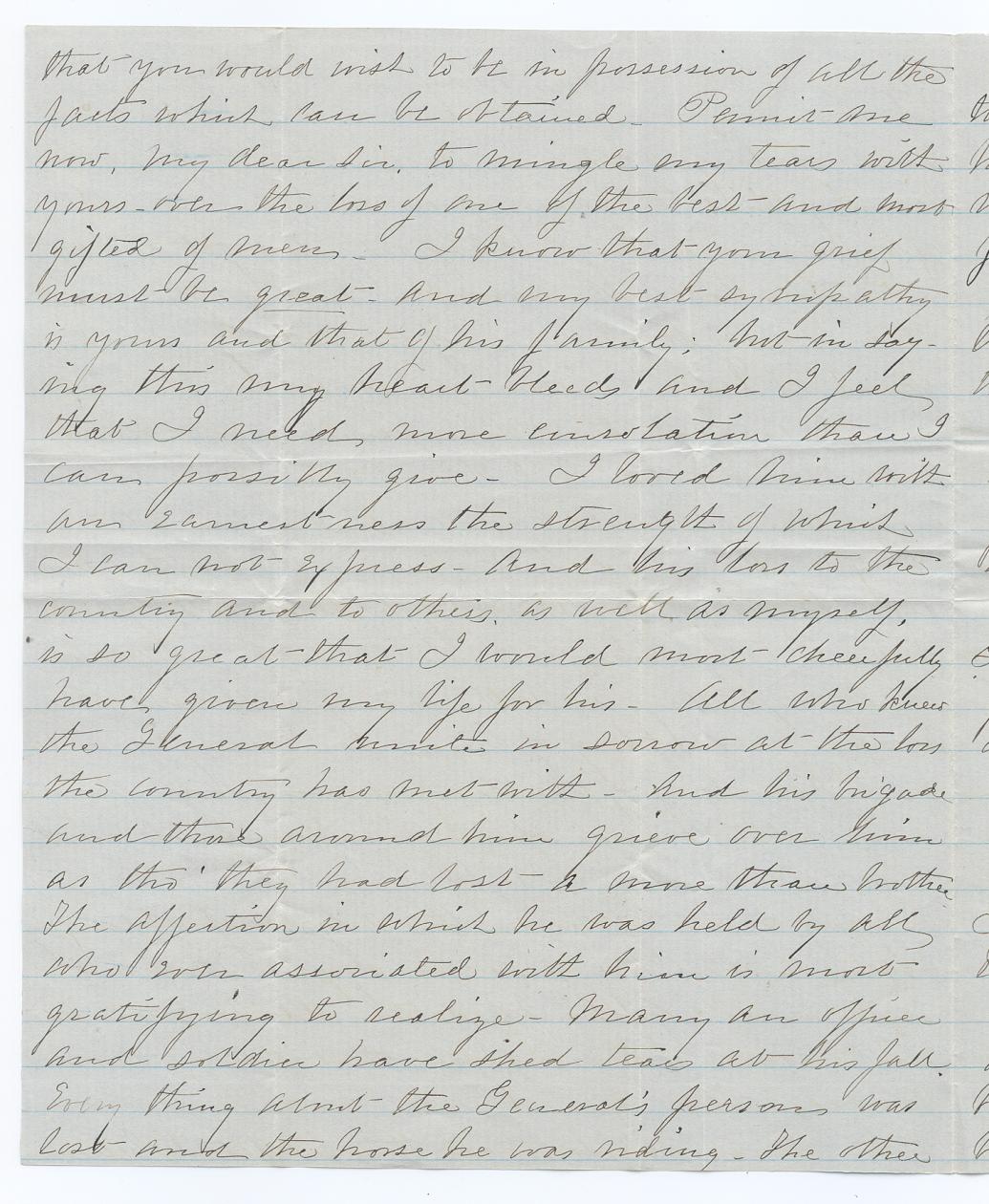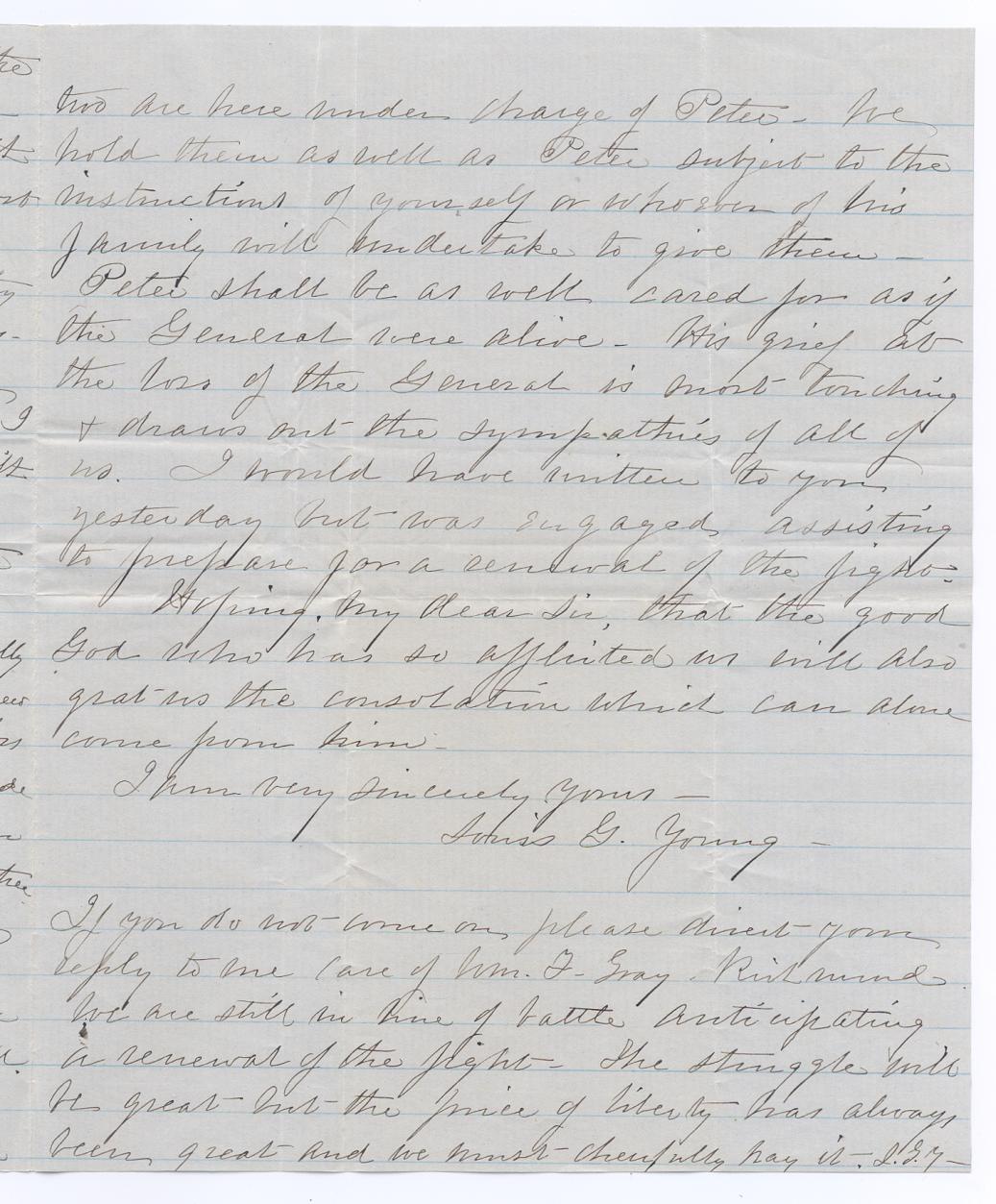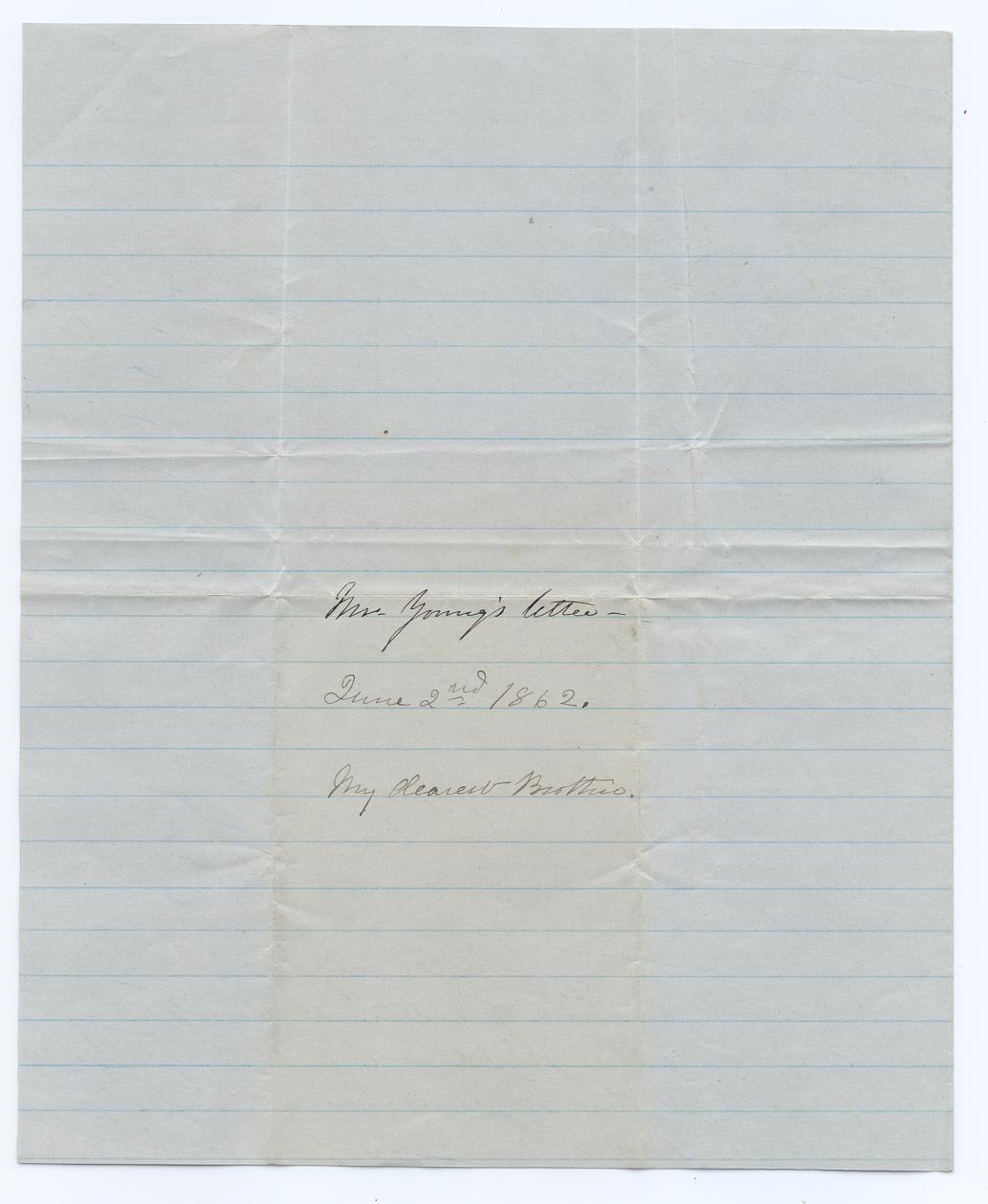Item description: Letter, dated 2 June 1862, from Louis Gourdin Young, aide-de-camp to Brigadier General James Johnston Pettigrew (CSA). The letter appears to be addressed to the General’s brother, William S. Pettigrew.
In his message, Young delivers a report on wounds suffered by General Pettigrew on 31 May 1862 at the Battle of Seven Pines. Attempts to rescue Pettigrew from the battlefield were unsuccessful and Young believes that the wounds must be fatal, saying, “From what I have written you will see that it is not certain that the General lost his life, but almost certain that he has.”
The letter also continues the saga of Gen. Pettigrew’s body servant, Peter. With his master presumed dead, Peter’s future is uncertain. Over the next few weeks, we will share a series of correspondence that will unfold the intertwined fates of James Johnston Pettigrew and his servant Peter.
Item citation: From folder 254 of the Pettigrew Family Papers #592, Southern Historical Collection, Wilson Library, University of North Carolina at Chapel Hill.
Item transcription:
Copy
Head Quarters 4th Brigade Genl. Whitings Division
June 2nd / 62
My dear Sir,
A warm friend and the Aide-de-camp of Genl. Pettigrew, I have the sad duty of confirming the intelligence you already have per telegraph of the fall in battle in the afternoon of the 31st ulto. of your brother. He had been instructed to drive the enemy from a wood where he was very strongly posted, there being also on his flank a battery of artillery, not hesitating for an instant, he led one of this regiments into a quarter from whence another of the regiments of the Division had just been driven. The wood was swept with a terrific fire from the enemy’s musketry and cannons and ten minutes after his entering it he was shot. The rifle ball taking effect as it is supposed in the left [lung?]. None of his staff were with him. We having been sent off to lead other Regiments into the action, but what I will now relate is from as reliable information as can be had. As soon as he was shot, the General himself dismounted but almost instantly from the loss of blood became so feeble that he had to be assisted to lie down. A Lt. Col. & a Capt. were with him – the former was shot down & the latter left to look for a surgeon, but before he could return the enemy had driven our troops back & the spot where he fell could not be approached. A Capt. who saw him lying wounded detailed four of his men & proceeded to take him off. The Genl. however asked him how the day was going, and the reply being that it was against us, and fearing some of the officers rallying their men, he insisted on the Captains leaving him to bring instructions to his aids as to the bringing up of further supports and to rally his men, at the same time insisting on the return of the four men to their company. When next seen he was found by the Adjutant of the 35th Georgia Regiment and a corporal of the 6th No. Ca. who say that he was in an insensible condition – he eyes fixed and he in an almost dying state. They brought him off as far as they could but were forced to leave him, after carrying him only a little further to the rear. This is all we can learn of him. And the field having been held & occupied by the enemy his body could not be recovered. As soon as I heard of the Genl’s fall, and had carried out his instructions I proceeded to the border of the wood in search of him. but was sent back by an officer just forced to leave, & who informed me that our troops were driven out of the portion where he was & that the spot where the General lay was in possession of the enemy.
I then devoted myself to rallying the Brigade and striving to recover the wood, but the men would not stand up against the terrific storm of shot & shell which swept the wood & all the practicable approaches to it. And night soon coming on we were compelled to withdraw.
In the night I made several endeavours with a party of men from the Brigade and two of his intimate friends from Hampton’s Legion to recover his body, but the General commanding, although consenting at first, on learning that the enemy were in the wood, did not permit us to go. A party did get as far as the border of the wood, but had to return on assurance of the presence of the enemy. From what I have written you will see that it is not certain that the General lost his life, but almost certain that he has. I was in hopes that we would have continued our attack the next day and that gaining the battle ground we would have taken off killed and wounded, but our troops were not in a condition for it the next day, and the enemy still hold the wood.
A flag of truce sent might enable us to get some of the dead & wounded. And some of the brigade speak of asking Genl. Smith to allow one, but I will not. The Genl. & myself often spoke on the subject of obtaining bodies in this way and we agreed that no intercourse of this kind should be ever had with such an enemy as that we are now at war with.
I have written you this in detail believing that you would wish to be in possession of all the facts which can be obtained. Permit me now, my dear Sir, to mingle my tears with yours over the loss of one of the best and most gifted of men. I know that your grief must be great, and my best sympathy in yours and that of his family. [Just?] in saying this my heart bleeds and I feel that I need more consolation than I can possibly give. I loved him with an earnestness the strength of which I can not express. And his loss to the country and to others, as well as myself, is so great that I would most cheerfully have given my life for his. All who knew the General unite in sorrow at the loss the country has met with. And his brigade and those around him grieve over him as tho’ they had lost a more than brother. The affection in which he was held by all who ever associated with him is most gratifying to realize. Many an officer and soldier have shed tears at his fall. Every thing about the General’s person was lost and the horse he was riding. The other two are here under charge of Peter. We hold them as well as Peter subject to the instructions of yourself or whoever of his family will undertake to give them. Peter shall be as well cared for as if the General were alive. His grief at the loss of the General is most touching & draws out the sympathies of all of us. I would have written to you yesterday but was engaged assisting to prepare for a renewal of the fight.
Hoping, my dear sir, that the good God who has so afflicted us will also grant us the consolation which can alone come from him.
I am very sincerely yours –
Louis G. Young
If you do not [come on?] please divert your reply to me care of Wm. F. Gray, Richmond. We are still in line of battle anticipating a renewal of the fight. The struggle will be great but the price of liberty has always been great and we must cheerfully pay it.
L.G.Y.
[written on back]
Mr. Young’s letter –
June 2nd 1862
My dearest Brother

